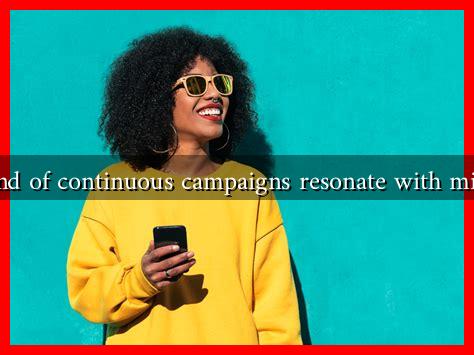-
Table of Contents
- What Kind of Continuous Campaigns Resonate with Millennials
- Understanding Millennial Values
- Types of Continuous Campaigns That Resonate
- 1. Cause-Driven Campaigns
- 2. User-Generated Content (UGC) Campaigns
- 3. Subscription-Based Models
- 4. Interactive and Experiential Campaigns
- Case Studies and Statistics
- Conclusion
What Kind of Continuous Campaigns Resonate with Millennials
Millennials, often defined as individuals born between 1981 and 1996, represent a significant consumer demographic with unique preferences and values. As brands strive to connect with this generation, understanding the types of continuous campaigns that resonate with them is crucial. This article explores effective strategies, examples, and insights into what makes campaigns appealing to millennials.
Understanding Millennial Values
Before diving into specific campaign strategies, it’s essential to understand the core values that drive millennial behavior:
- Authenticity: Millennials value genuine interactions and transparency from brands.
- Social Responsibility: They prefer companies that demonstrate a commitment to social and environmental issues.
- Experience Over Materialism: This generation often prioritizes experiences over possessions, seeking memorable moments.
- Digital Engagement: As digital natives, millennials are highly engaged on social media and expect brands to meet them where they are.
Types of Continuous Campaigns That Resonate
To effectively engage millennials, brands should consider the following types of continuous campaigns:
1. Cause-Driven Campaigns
Millennials are more likely to support brands that align with their values. Cause-driven campaigns that focus on social issues can create a strong emotional connection. For example, TOMS Shoes has built its brand around the “One for One” model, where every purchase contributes to a pair of shoes for someone in need. This approach not only drives sales but also fosters loyalty among socially conscious consumers.
2. User-Generated Content (UGC) Campaigns
Encouraging millennials to create content related to a brand can enhance engagement and authenticity. Brands like Coca-Cola have successfully implemented UGC campaigns, such as the “Share a Coke” initiative, where consumers were invited to share photos of personalized Coke bottles. This campaign not only increased sales but also generated a wealth of social media content that resonated with millennials.
3. Subscription-Based Models
Subscription services have gained popularity among millennials, who appreciate convenience and curated experiences. Brands like Birchbox and Dollar Shave Club have thrived by offering personalized products delivered regularly. These continuous campaigns keep consumers engaged and create a sense of anticipation, making them more likely to remain loyal to the brand.
4. Interactive and Experiential Campaigns
Millennials crave experiences that are interactive and immersive. Brands that create opportunities for engagement through events, pop-up shops, or virtual reality experiences can capture their attention. For instance, the Nike “Reactland” campaign allowed consumers to experience their new running shoes in a virtual environment, blending gaming with product promotion.
Case Studies and Statistics
Several brands have successfully implemented continuous campaigns that resonate with millennials:
- Starbucks: The Starbucks Rewards program encourages repeat purchases through a points system, appealing to millennials’ desire for value and exclusivity. According to a report by Statista, the program has over 19 million active members.
- Airbnb: The “Live There” campaign focused on authentic travel experiences, encouraging millennials to immerse themselves in local cultures. This approach has helped Airbnb capture a significant share of the millennial travel market.
Conclusion
In conclusion, continuous campaigns that resonate with millennials are those that align with their values of authenticity, social responsibility, and experiential engagement. By leveraging cause-driven initiatives, user-generated content, subscription models, and interactive experiences, brands can effectively connect with this influential demographic. As millennials continue to shape the market, understanding their preferences will be key to developing successful marketing strategies that foster loyalty and drive growth.

